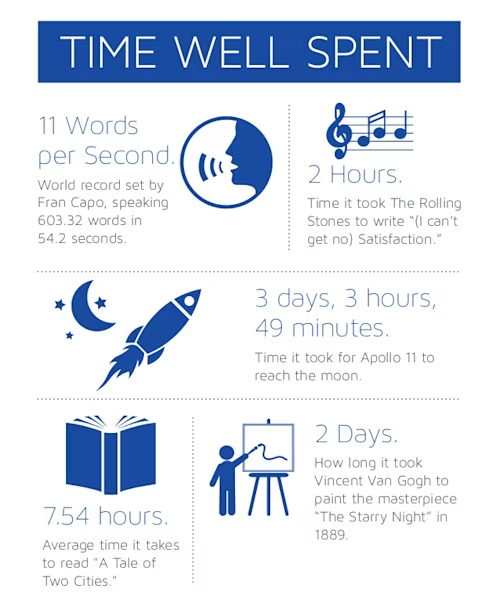
6 scary facts about time wasting (and how to fix them)
Check out these six time-wasting activities that we engage in throughout our personal and working lives and see what you can do to balance the scales.

Can you reduce your time-wasting habits at work and in your personal life? In this article, we look at ways to stop wasting time. Are you doing tasks that could be streamlined or automated? Thinking about how you are wasting time can help you free it up so you can spend time doing something more enjoyable, meaningful or inspiring. Read on to discover six scary facts about time wasting.
What does time wasting mean?
The Collins English Dictionary says that time wasting is the act of spending time doing something unnecessary and not producing any benefit. Many of us can think of days when we've wasted time at work due to unnecessary administrative tasks and emails. If you want to fix your time management and use time more effectively, firstly, you need to identify how you waste time.
6 scary facts about time wasting
Many workers waste time trying to locate documents. An IDC white paper published in 2012 contains the results of a global survey of 1200 information workers and IT professionals; it found that the time spent looking for documents was an average of 4.5 hours a week. Do you often find yourself trying to find paper documents? You're not alone. Finding and managing critical documents is a time waster for many employees. Digitising processes and using the right document storage system can simplify the process. Going paperless can save time too.
The commute to work can be a colossal waste of time. In 2018, UK government statistics demonstrated that the average commute to work was 29 minutes each way. That's almost five hours in a five-day week lost to the commute on average, with some commutes much higher. The pandemic showed us that technology gives us the freedom to work from home when needed. There was a 10% increase in the number of people doing any work from home in 2020 versus 2019. Around 37% of people did some work from home in 2020. Could there be more opportunities to expand the amount you work remotely in the future? That could save the average full-time employee around 252 hours per year.
According to Harvard Business Review, executives, are spending up to 23 hours a week in meetings. That's over 1000 hours per year. What's more, a survey by HBR of over 180 senior managers found that 72% said the meetings they attended were unproductive and inefficient.
A study by Harvard Business School of over 3 million people during the early days of the COVID-19 pandemic showed that employees were attending 13% more meetings than they were before working from home. To avoid wasting time in meetings, make sure the meeting is essential before you accept the calendar invite and follow an agenda.
In a recent study of working professionals, 40% reported getting interrupted 10 or more times per day. Meetings, texts, chat messages, emails, and conversations with work colleagues can really sap your time. You can reduce time wasted on emails by allocating specific times of the day to check your email and messages - for example, in the morning, during the middle of the day and at the end of the day. It will reduce the time you spend in your inbox.
A global study carried out by OnePoll indicated that employees were wasting time on admin, and 48% of the 5000 responders believed they would be more productive if they were given access to better office technology and tools. A Forrester Consulting report on the State of Systems of Agreement 2020, commissioned by Docusign, states that around 32% of respondents suggest manual agreement processes cause inefficiency, and 55% of respondents said they manually add information to contracts that already exist in their systems. In today's world, many manual tasks can be removed with automated workflows and streamlined processes to avoid repetition.
The latest Ofcom Media Nations Survey reported that the average amount of time people spent watching audiovisual content increased to an estimated 6 hours and 25 minutes per person per day, an hour and a half more than the average figure for 2019. It's easy to switch on Netflix, but is it really the best use of your free time? You might find that you could spend some of that time exercising to get healthier, meditating to relieve stress, cooking, helping a charity or even learning something new.
Here are some more examples of time well spent:

In summary: what should I know about time wasting?
Millions of people waste time at work and at home every week. The types of activities that can waste time include repetitive administrative tasks, time spent searching for documents, and wasted time in video calls and meetings. Identifying where you are wasting time can help you to reduce the time you spend on unproductive activities and can increase your free time.
What should I do to avoid wasting time?
There are many easy ways to improve time efficiency and reduce activities that waste time. Digitising processes and using the right document storage system can simplify the process. Access to better technology and tools can help workers. Using Docusign eSignature can help you get documents signed in minutes and makes it easier to locate them in the future. Working remotely can help reduce time spent commuting for all workers.
How do I optimise operations to stop wasting time?
Look to identify inefficient processes and unnecessary administration tasks that your employees are undertaking. Then look to digitise where possible with more efficient tools and technology. Look at the Docusign Agreement Cloud to discover how many organisations are optimising several areas of their operations.
Millions of people use Docusign eSignature every day. You can easily upload documents and get approvals signed in minutes or hours rather than days from almost anywhere in the world.
Here are a few more timely quotes you may enjoy.
"A man who dares to waste one hour of time has not discovered the value of life." - Charles Darwin
"Lost time is never found again." – Benjamin Franklin
"Forever is composed of nows." - Emily Dickinson
Related posts
Docusign IAM is the agreement platform your business needs



